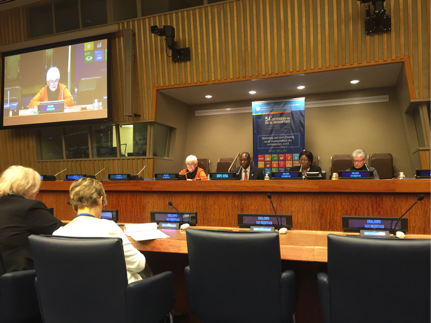
Statement For Informal Morning briefing for civil society
During CSoCD, 3-12 February 2016
My name is Frances Zainoeddin, representative of Gray Panthers, the NGO Committee on Ageing and the Stakeholder Group on Ageing. I want to thank the NGO Committee for Social Development for organizing these morning sessions.
According to the United Nations, virtually all countries are experiencing growth in the number and proportion of older persons in their populations. Today, two people reach the age of 60 every second. By 2030, people over the age of 60 will have increased from 12.3% to 16.5 % of the world population. By 2030, older persons will outnumber children aged 0-9 years. And, what’s more, those above 80 years of age are increasing even more rapidly than the older population as a whole. And the number and proportion of centenarians is growing even faster. In 30 years’ time – which go by as quick as a wink – older persons will constitute 22% of the world population.
We absolutely should take care of our infants and children, and ensure that they grow into healthy and productive young people. We absolutely should ensure that young people have quality education and employment opportunities. We absolutely should empower young people to take charge of their lives and have a say in policies and programmes that affect them. We do not want our children and grandchildren ignored or marginalized. But what happens to them when they reach 60? We certainly would not want them to be erased.
While we celebrate longevity as one of humanity’s greatest achievements, how many countries have effective policies and programmes that address the concerns of people who have actually made it beyond the age of 60? Or is it the general assumption and acceptance that people over the age of 60 have had their turn on earth, and they are no longer entitled to any attention?
Let us not forget that in some societies, even in this day and age, women over the age of 60 are regarded as witches. When governments talk about violence against women, why do statistics only go up to the age of 49? Have they not heard about elder abuse? Even though people over 65 account for three-quarters of death from non-communicable diseases (NCDs), the current age cut-off to measure incidence and death from NCDs is 70 years. What does this say about health policies? When Governments pledge to reduce malnutrition among those under 5 years of age, what about older persons who go hungry?
All people of all ages have the right to a decent life with dignity from cradle to grave.
Keep in mind that data are collected for what is considered “important”. What gets measured gets done, as the saying goes. We must persuade our Governments that children are important, the youth are important, indigenous peoples are important, persons with disabilities are important. Older persons are important. We all count and we must all be counted. From cradle to grave.
The third review and appraisal of the Madrid International Plan of Action on Ageing (MIPAA) has already begun and its findings will be presented to the Commission for Social Development in 2018. Will we see progress made with respect to older persons and poverty? Older persons and employment? income security? education? health care? Older persons in emergency situations? Will anything have changed in any meaningful way since MIPAA’s adoption in 2002? The Commission for Social Development must ensure that those findings are interfaced with implementation of the 2030 Agenda.
Will we also find that many older persons are independent, healthy, vibrant and productive members of society, participating in all walks of life, some taking leadership roles, including at the national level, some continuing their careers for many years beyond the age of 60, some starting new careers, others acting as role models, mentors, educators of the young, supporters of family, care-givers, volunteers, performing many useful and essential tasks for their families and their communities. Will we see that older persons are actually making a contribution to economic and social development? How many countries view people aged 60 and over as a resource and not as a burden? When will governments pay attention to the silver economy?
The NGO Committee on Ageing is also concerned about the human rights of older persons. The General Assembly has established an Open-ended Working Group that is deliberating on a binding multi-lateral instrument to protect and promote the human rights of older persons. We would like everyone to join in supporting those efforts. The next meeting of the Open-ended Working Group is likely to take place in July – please watch for notifications.
To those in the room who are under the age of 60, I want to say that many of us are planting trees under whose shade we may never sit. Those trees are for you. Help us grow them. Help us ensure that people of all ages, from cradle to grave, are included in all policies and programmes at the national, regional and international levels. We want our young people to have something to look forward to when they reach 60 and beyond – we do not want them to disappear from national data sets. Inclusion means that no one will be marginalized.
To those in the room who are over the age of 60, I want to say thank you for all that you have done and all that you are continuing to do. We thank you for your unfailing commitment to make this world a better place for all.
We call upon the Commission for Social Development whose mandate has always been to leave no one behind, to contribute fully to implementation of the 2030 Agenda, by making concrete recommendations for consideration by the High Level Political Forum.
We want everyone to live long and prosper, with dignity!!!